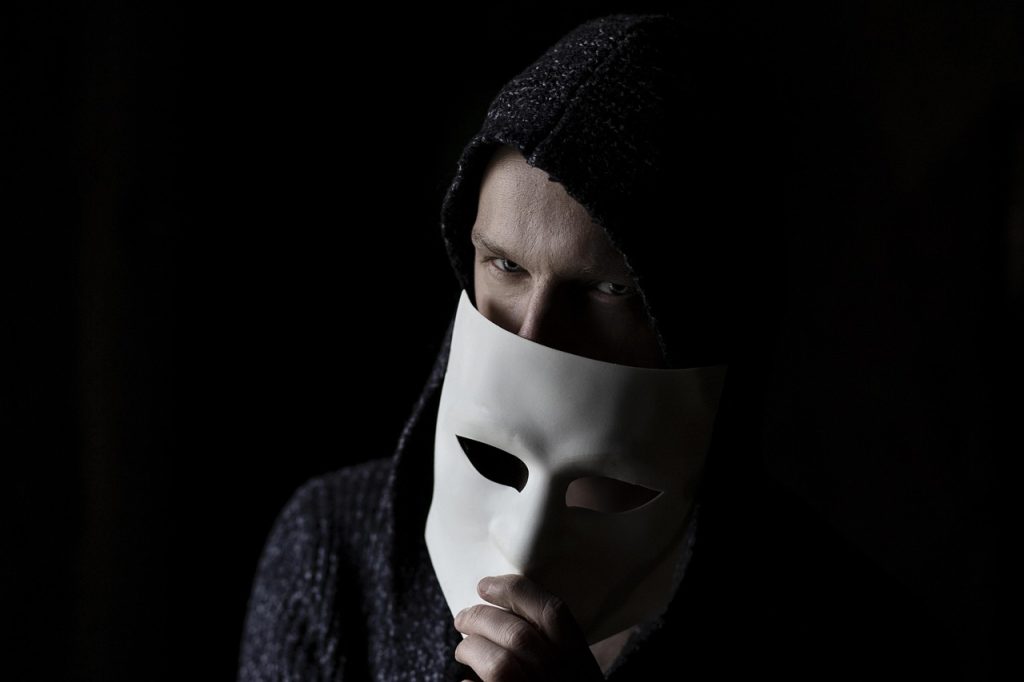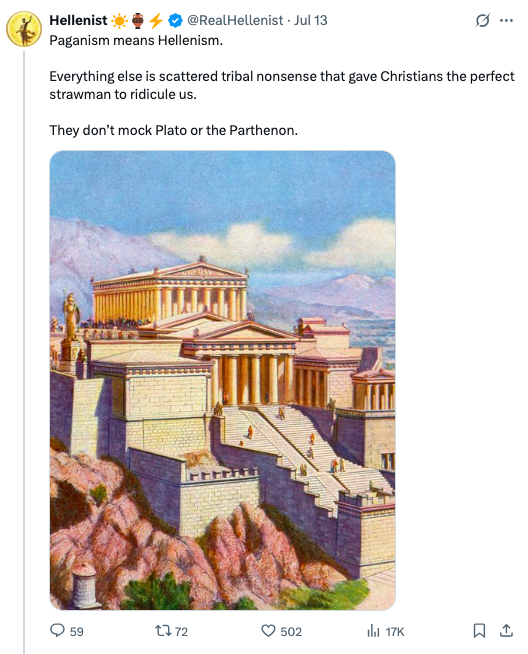Native European religions’ increase in popularity is real and inevitable.
Most of the Eastern Europe, for instance, has uninterrupted spiritual traditions that will blossom even with minimal revival efforts.
I’m using the umbrella term “Paganism” and I lump together all native European traditions – Asatru, Celtic faith, Hellenism, Dievturba, Romuva, etc. – here’s why.
Paganism looks good, feels right, and it serves Europeans well; that is why it will get more and more popular.
Everything that most Christians love about their faith is Pagan, so it’s inevitable that they or their descendants switch back as Christianity completely outs itself as a globalist subversion of our blood and spirit.
Just wait for some billionaire or a pop star to admit he is a European Pagan, and millions will follow.
However, there are internal dangers for Paganism, and there are many actors that transmit harmful ideas to poison our faith.
This will always be happening, and the best antidote is to have a bulletproof mindset and understanding why you do what you do.

As a Pagan parent, you have to be aware of these subversions and shape your kids’ worldview so that it’s immune to them.
Just because you care for your bloodline.
Here’s a list of the obvious threats that I’m noticing:
Modern “progressivist” worldview
If you are a European Pagan, sooner or later you will have to get into conflict with the modern world, in one form or another.
Ideas like toxic feminism, woke-ism, body positivity, child-free movement, and other branches of the Marxist tree – none of that is compatible with our native faiths.
These ideas are ungodly, titanic; they insist on changing our nature and do not serve us as species well.
Pagan worldview comes with the realization of concepts of honor, giftedness, inequality, responsibility, and complex intersections of fate and will.
While Paganism grows as a subculture, it’s natural that it gets injections of ideas from deeply modern-minded people that treat native faith as a vibrant hobby. But these injections need to be spotted and digested properly.
Universalism
Here’s an example of universalism among Pagans:

Of course, this is just a half-serious rage bait post, but the tendency is there. This is the spiritual heritage of Abrahamism and it needs to be nipped at the bud each time.
European Paganism is not a universalist religion.
You either follow the native tradition of the people you’re born into, or combine things from other European traditions that speak to you.
Address any of our Gods you want; empower those who empower you.
After all, our Gods, archetypes, ancestral worship, mindset, and attitude towards life are nearly the same across traditions.
Minor things can differ not just from nation to nation, but even from village to village.
For instance, one region can have a “male” sacred pine tree, while another region may have a “female”-spirited pine tree.
Festival dates may differ a bit.
Rituals can differ in style. Some regions cook an even amount of dishes for Dziady, the autumn ancestral worship feast, others – an odd amount of dishes. Each region has reasons to justify it.
And that’s OK.
Pagans may fight each other for power or resources, but we will never fight each other because one faith is “correct” and the other isn’t. If you’re geared for that, consider being a Christian.
“Re-invention” of monotheism
Constant philosophizing and focus on Platonism and whatever other philosophical currents it spawns leads to wasting time with useless and sometimes harmful questions.
“Are the Gods good?” “Who created the first God?”, monistic trends in Slavic Paganism, etc. – all this excessive overthinking and metaphysics is energy not spent on multiplying and getting stronger.
Most of this thinking is created in response to ex-Christians who are just used to consuming religious content. They convert to Paganism and habitually look for the same activities.
But the thing about Paganism is… You just have to live it.
Go through the roles life gives you year after year, worship the Gods and your ancestors, and you are be a “proper” European Polytheist.
Don’t worry about philosophy and theology until you start winning.
Superficial consumerism
Wicca is an example of such a trend – superficial, consumerist, often degenerate, and 100% dependent on the modern world.
All kinds of grifters sell crystals, magic wands, psychic readings, jewelry, merch, and what not.
But sacred objects come to you when you open up and touch the divine time and space. They are personal and unique.
An acorn you picked at the right time and in the right place may have more power and value for you than an Odinn figurine you can get on Temu.
It’s not about the merch you’ve got, it’s how you view the world and move through it.
Fixation on anti-Christianity
Christianity was designed to destroy Europe, and it played a massive role in weakening it. It was the start of the great replacement of Europeans.
European Pagans have all the rights to have disdain for Christianity.
However, with that said, solely focusing on debunking Christianity will not get you far.
It’s been over and done with, time to get past it.
Some Pagans obsess about being anti-Christian and make it their identity. That is neophyte behavior. Get it out of your system once, and don’t return to it again.
There is no point in that.
Be the torch others will want to follow. An example of something, not a hater of the other thing.
Demanding too much from yourself/gatekeeping
Everyone’s religious needs are different. Paganism quite naturally gives a space for any level of initiation.
The most important starting point is to address the gods, observe them, and anchor yourself to the wheel of year.
You have to start by celebrating, understanding and internalizing the four/eight main festive points – solstices, equinoxes, and points between them, – no matter which tradition you pick they are celebrated under different names.
Prepare for these days, observe customs, understand how gods manifest in each holiday, why we do what we do, what it all means, and how it strengthens you and your bloodline.
Do the same next year, then the year after. Rewire yourself to live and love the cyclical timeline.
Surround yourself with old art, imagery, objects, tales, and style along the way. Everything extra will come organically.
Keep it simple, don’t worry about your depth, and don’t gatekeep others.
Cuckoo stuff
Paganism attracts a certain number of people whose hobbies are things like weird and toxic stuff: “satanism”, “telemism”, tarot, and so on. Most of the stuff that originated as behind-the-curtain perversions in hypocritical Christian societies.
These things are a distraction, because they are born and bred to exist specifically within decaying Christian societies.

These can be gateway topics, or they can be your weird hobbies, but they are not European Paganism.
Too many people with a platform just function as subculture grifters.
That’s all they want to do – exist as some sort of an edgy kink master while living in the modern world.
Create a family and go through every year as a parent, as a homesteader, as an owner and doer of things, as a winner.
Centralization and over-organization
Like I wrote in the “universalism” section above, Paganism is a localized faith, and it will have to stay that way.
We need to have local differences between European peoples; we’re even OK with having differences between neighboring villages.
The roots are the same – we believe in the Gods in Nature, and we believe in our Ancestors and our blood.
Every man and woman is initially a priest, every head of the family is a priest, every organic community leader is a priest. There is no need for a priest class in most locations at this point.
A territory just has to agree on
- The main Gods and their domains
- the wheel of the year
- our mission as people.
Historic literalism
Our ancestors worshipped the way they did because the times were the way they were.
Reconstruction is useful, and it’s definitely a perfect starting point. But it’s not a law set in stone.
For instance, if you have to live in the city, a lot of rural traditions or logistics will be unavailable to you. You need to substitute them with similar rituals that fit your situation better.
Reconstructionism is also very resource-demanding and may act as a gatekeeping mechanism, which is wrong even if it’s done for the right reasons.
We all have things to do. We have different tastes and religious needs. Internalizing the Pagan mindset could be more important than being an eternal tourist at festivals and piligrimages to sacred places.
With that said, old texts and art are absolutely foundational. You need to read Homer, you need to read the Poetic Edda and sagas, you need to read your local fairy tales.
But once you understand all that and internalize the lessons, you need to be able to be on your own. No book will give you a rule for any occasion in life; you’ve got your own will and responsibility to navigate it.


Leave a Reply